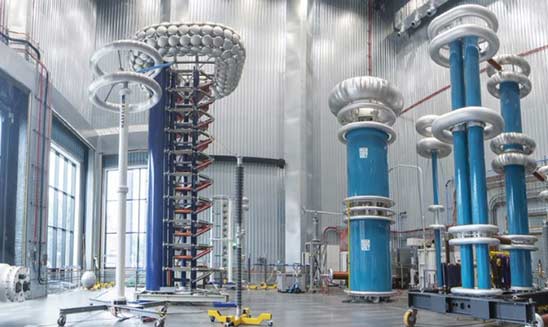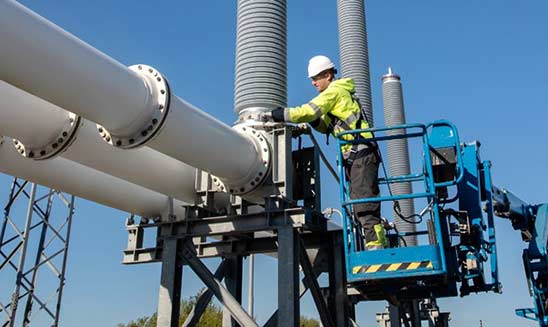
Research into power networks is pivotal for the discovery of renewable energy and low-carbon technology. Power Networks CDT was our comprehensive four-year Centre for Doctoral Training (CDT) program, designed to combine energy supply research expertise with industry needs, aiming to generate solutions for a low-carbon future.
At the heart of the UK’s efforts to reduce the carbon intensity of energy across power, light, heat, and transport, this program played a crucial role.
Programme overview
Our four-year initiative provided a multidisciplinary research training environment that worked towards our goals of supporting the electrification of energy (especially heat and transport) and encouraging greater use of low energy carbon systems. Uniting engineers, scientists, mathematicians, social scientists and business experts. This dynamic collaboration, involving schools and industry experts, empowered students to pioneer advancements in power network research.
-
Industry collaboration
Students conducted a diverse range of research projects working in collaboration wtih industry. These projects were sponsored by our partners across a variety of areas.
Discover further benefits of a CDT programme
-
Schools, colleges and the public
A key part of the M4DE CDT programme was public engagement and outreach activities, with each student taking part in supporting local schools and research placements.
Outreach is key to our Faculty's social responsibility
Training
The programme comprised of two key elements:
- Taught programme: developing understanding of the technical, cultural and financial context of Power Networks.
- Research phase: supported by academics and industry experts, students focused on developing innovative Power Network solutions for a sustainable energy future.
Research themes
To tackle complex challenges, our research was structured into four pivotal themes:
- Changes to the pattern of energy demands and their effect on the power network
- Cross-cutting technologies
- Electrical power network design, operation and management
- Power network operation, planning and governance.
Research with industry
We were privileged to collaborate with a high level of expertise from key industry partners, including National Grid, Siemens, and EA Technology. This collaboration played a pivotal role in shaping our programme from both academic and industry perspectives, and provided students with exposure to potential future employers and career opportunities.
Explore our notable industrial partners
Listed below are some of our partners who helped to ensure the research we conducted - had the best chance of making an impact.
-
Association of Greater Manchester Authorities
The ten authorities in Greater Manchester are the first in the country to develop a statutory Combined Authority.
The Greater Manchester Low Carbon Hub is a central proposition within Greater Manchester’s proposals for Deal for Cities and part of our growth strategy.
-
EA Technology
EA Technology is a world leader in products and services which enhance the performance, reliability, safety and cost-efficiency of power assets.
Our CDT enables EA Technology to significantly develop their research portfolio in a cost-effective way, as well as enabling them to work with the other large company sponsors of the Centre. Furthermore, involvement with the Centre enables EA Technology to offer a more attractive career path to current and potential employees in a way that goes far beyond what an SME can usually offer.
EA Technology website
-
Electricity North West
Electricity North West owns, operates and maintains the North West's electricity distribution network, connecting 2.4 million properties, and more than 5 million people in the region to the National Grid.
Their network covers a diverse range of terrain, from isolated farms in rural areas such as Cumbria, to areas of heavy industry and urban populations including Manchester.
Electricity North West delivers more than 23 terawatt hours of electricity each year to their customers in the North West.
Electricity North West website
-
National Grid
National Grid owns the Electricity Transmission System in England and Wales, the UK Gas Transmission System and four of the eight regional gas distribution networks in Great Britain.
National Grid is also the electricity system operator for Great Britain ensuring that the supply and demand of electricity is kept in balance.
National Grid website
-
Siemens
Siemens is a global manufacturing company with business interests in Energy, Healthcare, Industrial and Infrastructure and Cities.
Siemens website
-
UK Power Networks
UK Power Networks own and maintain distribution electricity cables and lines across London, the South East and East of England.
UK Power Networks website

Explore titles of students’ projects
Students on the Power Networks CDT programme conducted a wide range of research projects - there titles listed below:
- Advanced protection and control of future power systems to avoid blackouts
- Alternative structures for OHL transmission towers
- An assessment of the impact of distributed generation on directional overcurrent protection in distribution networks
- An assessment of the spatial variation in the risk of overheating in homes
- Analysing controller and device interactions in complex mixed AC/DC network
- Blockchain-based electricity trading for power networks
- Carbon emissions from a power system with high-penetration of spatially distributed renewables
- Control and stability of future power systems with up to 100% renewable generation
- Economic optimisation of energy use and energy storage and its influence on power networks
- Electricity access, micro-energy storage and human wellbeing in Sub-Saharan Africa
- Electrifying the city from below: towards distributed energy governance
- Enabling the secure interconnection of power systems
- Energy storage lifetime management
- Exploring the consequences of Internet of Things devices for informal infrastructures of the global South
- Fault location on transmission feeders using travelling waves, transients and power frequency signals
- Generalised modelling framework for multi-energy systems with model predictive control applications
- Heating and cooling demand effects on power networks in a changing climate
- Identifying and modelling critical infrastructure network independencies of AC/DC systems
- IEC61850 configuration management methodology
- Implementation of efficient big data analysis techniques to develop intelligent energy networks
- Initiation of electrical trees from planar surfaces
- Investigation of alternative paper ageing indicators for power transformers
- Learning from public engagement in multiple sectors to help plan power infrastructure, what can we learn from what is already happening in communities?
- Managing electrical power losses in railway networks
- Online stability analysis of power system networks with renewable source of energy
- Optimal coordination of large-scale multi-energy systems using distributed control architecture
- Optimal storage, smoothing and trading of wind power: assessment of performance achievements so far and the value of future performance improvements
- Performance modelling and decision analysis of decentralised energy systems and their impact assessment
- Planning for electric grid infrastructure: policy and governance
- Power generation from large-scale tidal stream turbine arrays
- Power networks for the future of aviation and shipping
- Quantifying system level investments for large scale PV integration in the UK electric power system
- Re-framing environmental impact analysis for power infrastructure using GIS
- Resilience assessment and adaptation of critical infrastructures to extreme weather and natural hazards
- Security and reliability studies for smart power networks
- Smart insulators: embedded sensor technology and self-powered communications
- Smart Urban Networks (SUN): unlocking capacity for low carbon technology in the electrical energy network
- Strategy and sequencing in resource acquisition: performance differentials in renewable energy generators
- The cooling demand of office buildings and the potential effects on power networks due to the impacts of climate change
- The dynamics and future-proofing of heat network governance - in the context of decarbonisation and infrastructure innovation
- The geographies of vulnerability to fuel poverty: a spatially-orientated analysis of neighbourhoods in England
- The impact of managing electricity consumption on consumers
- Thermal capacity of distribution transformers affected by the impact of low carbon technologies
- Transmission network protection, control and automation for non-deterministic system planning
World-class facilities
The University of Manchester has a range of outstanding facilities that supports both laboratory scale; and simulation and demonstration scale research activities.
-
High Voltage lab
The biggest electrical infrastructure test and research facility in UK academia, helping to transform the future of high voltage.
Read more about the biggest electrical infrastructure
-
National Grid power systems
The UK’s largest high voltage laboratory capable of testing equipment intended for operation on all existing high voltage UK networks.
National Grid named Best Innovation in Net Zero
Our people
We are proud to introduce the academic staff and students involved in this Power Network CDT programme.
-
Ruth Wood
Director of the CDT and senior lecturer in Environment and Climate Change -
Our graduates
Who not only graduated as experts in their research niche; they gained a broad skill set, a wider understanding of power sector challenges, and a network of lifelong colleagues.
Explore graduates and their thesis titles
- Mahmoud Alhalaby - Alternative structures for OHL transmission towers
- Josep Bernat Bereguer - Enabling the secure interconnection of power systems
- Charlotte Brown - An assessment of the spatial variation in the risk of overheating in homes
- Claire Brown - Heating and cooling demand effects on power networks in a changing climate
- Simon Bullock - Power networks for the future of aviation and shipping
- Philippa Calver - The impact of managing electricity consumption on consumers
- Timothy Capper - Blockchain-based electricity trading for power networks
- Joseph Chambers - Exploring the consequences of internet of things devices for informal infrastructures of the global south
- Youhong Chen - Analysing controller and device interactions in complex mixed AC/DC network
- Niall Coogan - Strategy and sequencing in resource acquisition: performance differentials in renewable energy generators.
- Ami Crowther - Electrifying the city from below: towards distributed energy governance
- Yitian Dai - Identifying and modelling critical infrastructure network independencies of AC/DC system
- Timna Denwood - Re-framing environmental impact analysis for power infrastructure using GIS
- Christian Emenike - Implementation of efficient big data analysis techniques to develop intelligent energy networks
- John Fradley - Control and stability of future power systems with up to 100% renewable generation
- Christoph Hachmann - Power generation from large-scale tidal stream turbine arrays
- Mingyu Han - Managing electrical power loses in railway networks
- James Hill - Thermal capacity of distribution transformers affected by the impact of low carbon technologies
- Sam Jackson - Smart insulators: embedded sensor technology and self-powered communications
- Basit Jafri - Resilience assessment and adaptation of critical infrastructures to extreme weather and natural hazards
- Majd Jayyousi - Electricity access, micro-energy storage and human wellbeing in Sub-Saharan Africa
- Barry Johnston - The dynamics and future-proofing of heat network governance
- Chloe Jones - Online stability analysis of power system networks with renewable source of energy
- Melake Kuflom - Transmission network protection, control and automation for non-deterministic system planning
- Chouhon Leong - Planning for electric grid infrastructure: policy and governance
- Andrew Little - Carbon emissions from a power system with high-penetration of spatially distributed renewables
- Gaoyuan Liu - Advanced protection and control of future power systems to avoid blackouts
- Sebastian Long - Generalised modelling framework for multi-energy systems with model predictive control applications
- Angeliki Loukatou - Optimal storage, smoothing and trading of wind power: assessment of performance achievements so far and the value of future performance improvements
- Alexandros Mannari - Quantifying system level investments for large scale PV integration in the UK electric power system
- Harry McDonald - Initiation of electrical trees from planar surfaces
- Matthias Noebels - To be discussed
- Idowu Oyebanjo - An assessment of the impact of distributed generation on directional overcurrent protection n distribution networks.
- Mahmood Parsi - Fault location on transmission feeders using travelling waves, transients and power frequency signals
- Karolis Petruskevicius - Economic optimisation of energy use and energy storage and its influence on power networks
- Stephen Potts - IEC61850 configuration management methodology
- Caitlin Robinson - The geographies of vulnerability to fuel poverty: a spatially-orientated analysis of neighbourhoods in England.
- Matt Sanderson - Learning from public engagement in multiple sectors to help plan power infrastructure
- Ilias School - Security and reliability studies for smart power networks
- Michael Taylor - Optimal coordination of large-scale multi-energy systems using distributed control architecture
- Vasileios Tsormpatzoudis - Energy storage lifetime management
- Edward Uduji - Smart urban networks (SUN): unlocking capacity for low carbon technology in the electrical energy network
- Ting Wu - Performance modelling and decision analysis of decentralised energy systems and their impact assessment
- Zong Yan - Investigation of alternative paper ageing indicators for power transformers
- Vasco Zeferina - The cooling demand of office buildings and the potential effects on power networks due to the impacts of climate change
Recruitment
Looking for a programme accepting applications?
- Explore our types of research degrees
- Contact our Doctoral Academy for recruiting centres.










